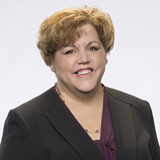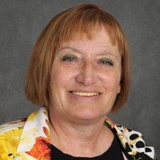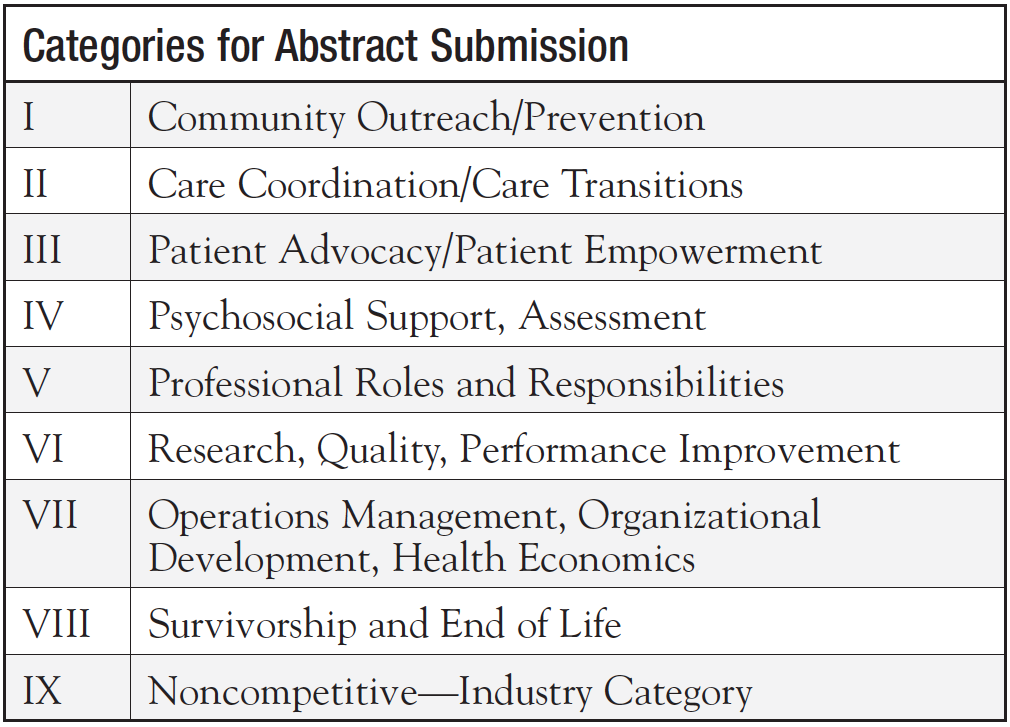“I’m a lay navigator in a small community hospital. What do I do that is worth sharing with AONN+ members?”
“I am already in a support role as a nurse navigator; what science is involved in that?”
“I could never write an abstract.”
“I don’t even know where to begin."
There are many excuses for not writing an abstract. You may even be hesitant to share your work. However, there are even more reasons to share how and why you embrace your navigation. Abstracts pretty much write themselves. Just remember, if someone has seen one navigation program, they have seen just that one navigation program. Every program also finds value in differing aspects of the role. Patients deserve to receive high-quality care so they can achieve high-value outcomes.
“There is no one alive that is you-er than you,” said Dr Seuss, and your perspective is unique. You, the navigator, regardless of your location or role, are the lifeblood of AONN+. Nurses, lay navigators, financial counselors, social workers, patient advocates, and administrators, we all have 1 mission—to take great care of patients. We are here to navigate the patient through the oncology experience in the most patient-friendly, expedient, cost-effective, and logical manner possible.
Looking back at some of the poster presentations from 2018, it becomes quite evident how much we can all learn from each other. One navigator initiated an assessment for all newly diagnosed patients immediately after the patient had received his/her diagnosis from the physician. Although similar to the mandatory distress screening required by the Commission on Cancer, this assessment identifies barriers and lifestyle issues that may impact treatment. These include literacy, financial toxicity, transportation, housing, prescription assistance, clothing needs, and nicotine dependency. Wouldn’t we all love to see their assessment form and implement it at our facilities? This program has helped the navigator better understand her patients and meet their needs.
Another navigator began a preoperative education program for her patients to lessen their anxiety about oncology surgery and follow-up treatment. This educational component embraces the IOWA model and the visual analog scale. Do you use either of these methods at your location? Another poster addressed how to deliver survivorship care plans. Don’t be afraid to admit it: we all struggle with how to deliver care plans effectively. Doesn’t this make you want to know more about how they did it?
No idea is too small for consideration. There are resources available. The Abstract Review Subcommittee partners with the Assistance for Quality Improvement and Research (AQUIRE) Subcommittee. AQUIRE can provide you with the tools necessary to conduct meaningful research. Are you throwing up another roadblock here? “I am not a researcher!” We say, yes, you are! We all conduct research on a daily basis. Is this catheter better than the one we previously ordered? Is the additional cost worth it in terms of comfort or ease of insertion? See? You do research in your daily practice, but you don’t think of it that way.
We know, we know. You are overworked, underpaid, and stressed to the max. But, you love your work and are devoted to your patients and committed to making a difference. Enter the Metrics Subcommittee. In this day and age, data rule. You know that you can’t approach your administrators with an idea for improvement (especially if it involves asking for money or more staff) without cold, hard facts to back it up. The Metrics Subcommittee has developed metrics over the past several years related to navigation. They have proved the need for all these categories. Wouldn’t it be helpful for you to be able to back up your request to the administration for additional staff with metrics that prove you need 2.5 full-time navigators to successfully accomplish what they expect you to do alone?
Hopefully, you are now starting to nod your head and acknowledge your own worth to the profession of oncology navigation. We can all learn from each other. That can only happen if we share our practices, our successes, and our failures. Share our failures? Yes! Sometimes we have great plans that we think will make a huge difference, and then we find that, despite pouring resources in to something, it did not have the impact we desired. This is important to share as well, and 2 poster presentations last year did just that. In other words, you can save your peers some energy, and maybe they can save yours too!
Commit to submitting an abstract this year for poster presentation at the national conference! AQUIRE can help you produce material that is not only beneficial to AONN+ members but will be worthy of publication in peer-reviewed journals. Administrators do like to see their staff recognized in publications. Publishing not only gives credit to the authors but also to the institution as a place of quality and one of which to take note.
Start off easy. Make a list of practices and programs you have at your institution. Do you have pet therapy? Housecleaning for survivors? Massage for staff? An incredible assessment tool? Pertinent information on medical marijuana? An eye-catching community presentation on smoking cessation? A method that cuts down on no-shows in your clinic? One-stop shopping for all your services? How do you handle bilingual phone calls? Who follows up on patient complaints? Some winning abstract titles from last year were: “The Navigator’s Perception of Transitioning from a Single-Facility to an Integrated Multifacility Navigation Model” and “Exploring the Nurse Navigator’s Role in Advanced Care Planning for Early-Stage Cancer Patients.” You can see how vastly different these were, yet the data were sound, and both won Excellence in Research awards.
Once you have listed your programs/policies/practices (and we are sure you will be amazed at how much you do), pick 1 to 3 topics that you think other navigators across the nation, and globally, may appreciate and could adapt to their own practices. Then review the categories and decide which most represents the data you want to share. If you are unsure of the category or if you have questions, send us an e-mail. We will be happy to speak with you about the options of how to proceed.
Last year, we had a record-breaking 93 abstracts submitted. Of those, 79 were accepted for poster presentation, and 8 were chosen for oral presentation. This was almost double the numbers from 2017. The most heavily submitted category was Care Coordination/Care Transitions. This year we hope to receive over 100 abstracts and have over 100 posters. What a great way to present your data, show value in your program, network, and share our common value.
Here are some common pitfalls when writing abstracts:
- Background/evidence not included—state why you are conducting the research/project
- Citations, sources—if there is nothing currently published, you may have groundbreaking information. Make a statement that you researched the topic and found nothing in a credible source
- Background and goals confused or interlaced—background is the history of the problem, and goals are what you set out to measure or learn
- Details missing, particularly related to process steps in methods—when you surveyed, what kind of survey, how many people, and who gave permissions?
- Data collection—how are data collected, and at what time points? Be specific
- Measures missing—if you didn’t measure something, state the limitations of the study. If you wish you had measured something else, state that, but report on what you did measure. What scales did you use?
- Clarity between goals and conclusions—do the conclusions reflect the goals?
- Application to broader audience—can others benefit from this information? How?
Don’t forget you have lots of resources at your disposal to help—the AQUIRE, Abstract Review, and Metrics subcommittees. We are all in this together. We want to unlock your potential and share your stories with your fellow navigators.
If you are interested in joining our subcommittee, we have openings and are recruiting reviewers. Simply fill out the Abstract Review Subcommittee application under the Committees section on AONNonline.org. The mission of the Abstract Review Subcommittee is to objectively review AONN+ member abstracts and provide feedback for revision, with the greater goal of building momentum and evidence around navigation. We would love to have you on our team. You do not have to attend a conference; you can do the work from home.
Good luck on this journey; know that there are a lot of people to support you, and we want to see what you are doing. Together we will make oncology navigation a powerful force in the industry, and we will do it through shared knowledge and excellence in the field. We cannot do that without you, and that is truer than true!
Submit your abstract at www.aonnonline.org
Abstract submission portal is open April 8, 2019, through midnight ET July 3, 2019.






